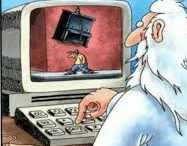
No Santa, No God?
Kathleen Kalt, who is 68 and lives in Florida, was raised a Catholic. She says she lost her faith in the first grade when she discovered there is no Santa Claus. She had discovered a bike in her family’s storage room that she knew was a Christmas gift, not a gift from Santa.
“My brain just went: tooth fairy, Easter bunny, God. It took less than a minute, a very traumatic minute. I realized I was on my own at 6 years old,” she told Jessica Grose, who writes a New York Times newsletter. Kalt said she doesn’t believe in God, but observes Buddhist rituals, adding that she “will often say the rosary as a meditation because it’s second nature to me.”
Kalt was among people Grose interviewed for a series of stories about “nones,” the term for those who have answered “none” on questionnaires about religious affiliation. That group has grown substantially in the last few years, worrying religious leaders and apparently cheering people who believe that religion is nonsense.
The Cultural Landscape
“Sometimes,” Grose wrote, “their beliefs … evolved because of whatever was flowing through the cultural landscape of their day.” She found that three trends emerged among the “nones” she interviewed.
“Several had switched religious affiliation more than once; I’ll call them seekers. Others had an abrupt break from church in their youth, after which they became atheists or agnostics; I’ll call them skeptics. And there were others who drifted away from religion fairly late in life; I’ll call them slow faders, because their religious evolutions took time.
Many More Categories
Personally, I think there are many more categories, such as those who become doubters in college when unable to reconcile science with religion; those who become disenchanted with religious leaders because of what happens at their church or synagogue; those who were scandalized by clergy abuse of kids and teens, especially in my own Catholic church; and those who simply see religion as irrelevant.
Even though I write these blogs from the viewpoint of a believer, I can relate to all those who find it difficult, or impossible, to believe. I’ve been there. However, I have a few observations that might help people who are sincerely searching for God.
First, the search requires some work. With due respect to Kathleen Kalt, you shouldn’t make a decision as formidable as giving up your faith in “less than a minute” or at the age of six. You need study and prayer. And being a skeptic is no obstacle. God invented the brain and expects us to use it.
Feelings Unreliable
Second, you have to acknowledge that in the search for God (and in most other aspects of life), feelings are unreliable. Emotions are certainly part of the religious experience, but faith, despite what skeptics say, is rational and requires thought. And to be true to yourself, you can’t make the choice for or against religion based on contemporary trends.
Third, religion is not principally a matter of rituals or doctrines but of a relationship with God and others. And of all human endeavors, religion is best equipped to help people in their search for God.
People who have studied and prayed with open minds and hearts know that the existence of Santa or the Easter Bunny has nothing to do with the existence of God, whose presence has been experienced by billions of witnesses over thousands of years.




